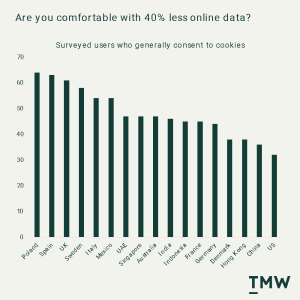— August 1, 2019
Social networks are massive outlets and continue to grow every year. And while social media was designed primarily for sharing personal life events, videos, and random status updates, it has evolved into something much larger today.
Now, consumers and business professionals gravitate to social platforms for product recommendations and to research purchasing decisions.
And how popular have social networks become, especially the big three (Facebook, LinkedIn, Twitter)? Close to half the world’s population (3.03 billion people) is on some type of social media.
But the challenge for most B2B organizations is having their brand seen and stand out in a crowded space. This is increasingly true as social algorithms change to make it harder for brands to be seen.
Then you need to factor in that 96% of the people who discuss brands online do not follow those brands’ owned profiles.
This is why your organization should build a strategy in which employees share and engage on social media on behalf of your brand.
Employees on Social Media
A Nielsen study showed that 84% of people trust recommendations from friends, family, and colleagues over other forms of marketing. And that number continues to grow!
Your organization’s branded social accounts are important for sharing, interacting with customers/clients, and establishing an online presence.
But it’s your employees’ social networks that actually amplify brand visibility, increase lead quality, drive web traffic, and boost social recruiting. This strategy is called employee advocacy.
You might be concerned about your firm’s employees sharing information about your business on their personal social media accounts. But guess what? Chances are, most of your employees are already sharing about your company online or talking about the brand to others. According to global PR firm Weber Shandwick, “98% of employees use at least one social media site for personal use, of which 50% are already posting about their company.”
It’s why many well-known brands like Dell, Adobe, and T-Mobile are harnessing employee social reach and adopting an employee advocacy program to make social sharing easier.
And this concept of employees being active on social works across industries. Firms in technology, telecommunications, finance and accounting, staffing, commercial real estate, and other professional services are adopting social employee advocacy.
The Benefits to B2B Organizations
Now that you understand a bit more about enabling employees to get involved in social media, you might be wondering how it actually benefits your organization.
Below are a few key areas of your organization where having an employee advocacy strategy and program in place can significantly boost business results.
Marketing
In many ways, employee advocacy was born in the marketing department (even if it has expanded since). Under an employee advocacy program, your employees act as an extension of the marketing team, expanding your brand influence.
Here’s why having employees on social media helps your marketing:
- Drives increased brand visibility and reach
- Saves money on the ever-growing costs of paid social
- Increases organic leads and the quality of leads
- People trust recommendations from family, friends, and colleagues over other forms of marketing
According to the Hinge Research Institute, “79% of firms surveyed reported more online visibility after the implementation of a formal employee advocacy program. 65% reported increased brand recognition.”
Sales
Where there is a benefit to marketing, there is a direct positive effect on sales, as well.
Email and phone aren’t delivering the same results they used to, which is why many sales teams are turning to social media. Typically called “social selling,” this practice is crucial in our digital age because many of the audiences sales people want to reach are on social media.
But sales teams’ are just part of the story — when activated on social media, employees also drive sales results.
Employees on social help sales:
- Increase deal size
- Improve win rates
- Boost the pipeline by more than 2x
In fact, “an employee advocacy program can drive 16% better win rates, 2x pipeline, and deliver 48% larger deals,” according to EveryoneSocial.
Employer Brand
A big reason employer branding is so important today is it’s how people perceive your company and work culture.
And a positive employer brand helps to attract and retain quality employees, who are crucial to the success and growth of the business.
But it’s also important to how buyers and prospects view your brand as well.
Employees on social help an employer brand by:
- Showcasing workplace culture
- Helping to drive top talent
- Increasing new hire retention
This is what Glassdoor has to say: “75% of U.S. respondents believe that companies whose C-Suite executives and leadership team use social media to communicate about their core mission, brand values and purpose are more trustworthy.”
For Employees
While your company stands to benefit from employees advocating on your firm’s behalf online, you employees also benefit.
How? It provides opportunities to boost their professional profile online, grow their networks, better engage with their audience, build meaningful relationships, and expand their professional reach.
In short, it helps them become more informed, connected, and engaged.
Final Thoughts
Hopefully, this post has helped you develop a greater appreciation for employee advocacy and how a program can help your company drive better results in the areas of marketing, sales, communications, and HR.
Employee advocacy applies to companies of all types and sizes: social media is the latest frontier in business and it’s only just getting started.
Moving forward with establishing your own program also puts you in the enviable position of being an early adopter. There are far fewer risks than there were a few years ago — and many of the opportunities have been amplified.
Digital & Social Articles on Business 2 Community
(37)
Report Post
